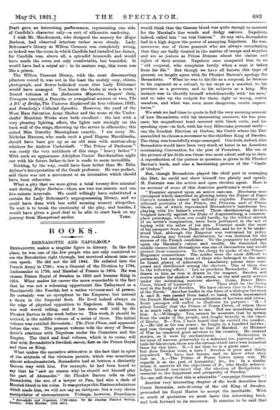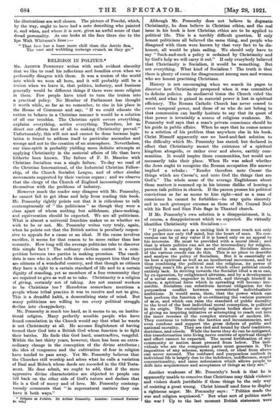BOOK.
BERNADOTTE AND.. NAPOLEION..*
BaRriAnorrn. makes- a shaggier figure. in history. Lithe first place,, he was one, of the few people who not, only contrived, to see- the Revolution. right:through, but survived almost into our own °pooh. He did not the till- 1844. Re. enlisted into the French Army in 1180; was a General of' the Division by 1794, Ambassador in 1798, and Marshal of France in 1804. He was chosen Prince Royal of Sweden. in 1810 and became King in 1818. What maker his career-the. more remarkable is the fact that he was not a scheming opportunist, Me. Tedleyrand or a Maechiavelli like Fouehe,.but a rather virtuous sort of. person., He certainly was- no sycophant to the. Emperor, but instead! a thorn in the Imperial flesh. He &ed indeed always on the edge of physical opposition to Napoleon.. His life, then, was well worth telling,, and it has been well told by Sir Plunket Barton in. the work before-us: This work, it should, be noticed, is the • middle volume of a series of three. The initial volume was. entitled-Bernadotte : The First Phase,, and appeared before. the war. The present volume tells, the story of Berne- dottets relations- with Napoleon under- the Consulate and the Empire. The third and final volume, which is to come; will' deal.with,Bernadotte's . Swedish career,. first as the Prince Royal and then. as- King.
What makes the narrative attractive is the fact that in spite of the attitude. of the virtuous patriot, which was sometimes almost sohoolmasterish, Bernadette had at bottom a distinctly Garcon way with him. For example, he had been heard to lay that. he "saw no reason why he should not himself play the put. of .Alexander." Sir Plunket Barton tells us that Bernadotte, the son of a lawyer at Pau, had also a dash of Mooriakbloodin his veins. It was perhaps this Easternadmixture Which made him, we will not say an intriguer, but a very clever manipulator of circumstances. Perhaps,. however, Frenchmen sinuskta and Napoleon, 1799-1810. Br flir Dunbar Ptucket Barton. Laudon: John Murray. Vala. not.] would think that the Gamma blood was quite enough to account for the Marshal's fine words and dodgy aotions. Napoleon, indeed, called him " tur._ vrai Gamma." At any rate, Bernadotte had in a high degree the power of annoying Napoleon. He-was, moreover, one of those generals who are always complaining that they are badly treated in the matter of troops and supplies and are as jealous as Prima Donnas about the claims and rights of their armies. Napoleon once compared him to an "old corporal, who complains lustily when a man is taken from his Me." But though we have all known this type of general, we largely agree with Sir Plunket Barton's apology for Bernadotte. "What he was to his file as a oorporal, he became
to his regiment as a colonel, to his corps as a marshal, to his province as a governor, and to his subjects as a king. His
instinct was to identify himself wholeheartedly with his men,' and. to take up the cudgels for them, right or wrong, contra mundum, and what was even more dangerous, contra itnpera- torem."
We wish we had time to quote 'in full the very amusing account of how Bernadotte, with his insinuating manners, his fine pres- ence, his magnificent head covered with black curls, and his speaking eyes—in fadt„with his very Hibernian personal outfit— ran the Swedish Election at Orebro, the Castle where the Diet assembled to choose a successor to the &Mess King of Sweden. The thing was beautifully stage-managed. One feels, indeed, that Bernadotte would have been very much at home in an American nominating Convention for the post of President. His use of the picture of his-little son Oscar was most adroit and up to date. A reproduction of the picture in question is- given in Sir Plunket Barton's book, and also a fascinating picture of the "Castle of Orebro."
But, though Bernadotte played the chief part in managing the Diet, he could not show himself too plainly and openly. M. Fournier was the active and open election agent. Here is an account of some of this dextrous gentleman's work :—
"Fourniet entered upon an active canvass. Brochure, were circulated which described in glowing terms the Prime of Pont° Corvo's romantic career and military exploits. Fournier dis- tributed portraits of the Prince, the Princess, and of Prince Oscar, one of which represented Bemadotte's handsome boy playing with his father'S sword These electioneering devices weighed heavily against. the Duke of Augustenburg..a.common- place personage, whose son could hardly, by the wildest stretch of an artist's imagination, have been portrayed in the act of toying with the sabre of his sire. Fournier made the most of his passport from the Duke of Galore, and he let it be under- stood' that, although the Emperor was restrained by policy from making any formal declaration, he was desirous for the success of the French candidate. To the peasantry he enlarged upon the Marshal's valour and wealth. He reminded the middle classes.that Bernadotte was one of themselves and, would protect their commerce. To the clergy he spoke of the Prince's Huguenot connections. The nobles were the most difficult to persuade, but among those of. them who belonged to the army he found plenty of adherents. Laudatory poems were com- posed and distributed among the electors. One of them was to the following effect : 'Let us proclaim Bernadotte. We arc drawn to him as iron is drawn to the magnet. Sweden will revive under, the shadow of his sword as the arid earth reviv.es under the refreshing summer shower. Come, Brave Hero. Come, friend of humanity ! . . . Thou shalt be the living soul in the body of Sweden. We have chosen thee to be Prince of.the North.' Another leaflet in the form of adialogue between A. and B. was passed from hand to hand, which. represented the French Marshal as the personification of heroism and virtue. Some passages will suffice to illustrate its purport : 'B.—I admit frankly that the Prince of Porte Corvo, of whom there is se rmich talk, is unknown to me. Tell me something about him. A.—Willingly. You cannot be unaware that he sprang from the ranks of the people, and fought bravely in the cause of liberty. B.—Yes, I have heard that he carried the musket. A.—He did. so for ten years ; he fought in a hundred battles ; and rose through every rank to that of Marshal. As Minister of War he rendered good services to his country. He created armies, as it were by enchantment. . . . Moderation in his hour of' success, generosity to a defeated foe paternal solici- tude for his troops, these are the virtues which lia;re won immortal fame for this hero. B.—I see that he is a great raan . . . but does Sweden want a hero? Sweden is poor and thinly populated. We have had heroes, and we know what they cost us. A.—The Prince of Ponta Corvo hates war. He regards it as the pest of humanity,' &c., &e. In a similar strain A. answers all the objections of B., who finally acknow- ledges himself convinced that the election of Bernadotte is essential to the happiness and prosperity of Sweden."
No one will deny that this is admirable "campaign literature" I
Another very. interesting chapter of the book describes how Count Suremain, aick-da-camp of the old ICmg of Sweden, persuaded his Royal Master to accept the inevitable. With so much of quotation we must leave this interesting book, and look forward to its successor. It remains to be said that
the illustrations are well chosen. The picture of Pouch& which, by the way, ought to have had a note describing who painted it, and when, and where it is now, gives an awful sense of that dread personality. As one looks at the face there rise to the lips Walt Whitman's lines :— " That face has a haze more chill than tho Arctic Sea. The vast and wobbling icebergs crunch as they go."



































 Previous page
Previous page